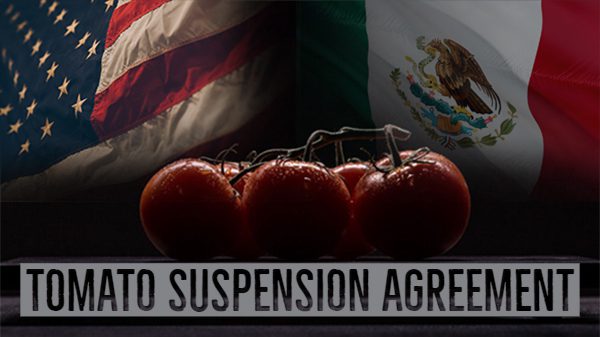NOGALES, ARIZ. (October 23, 2023)– In the most recent development from the Florida Tomato Exchange’s BB #:162441 fight to terminate a successful tomato trade agreement, today marks the close of the month-long rebuttal period and the start of the U.S. Department of Commerce’s (Commerce) decision-making period.
Since initial public comments were submitted in September, there has been an outpouring of defense for the long-standing Tomato Suspension Agreement (TSA) from businesses, organizations, academics, and Commerce itself.
“The support we have seen for the Tomato Suspension Agreement in recent months confirms what we already know: consumers, businesses, and leaders alike understand the benefits of this Agreement. What’s more, they understand that terminating the Agreement would have far-reaching and unjustifiable repercussions throughout the U.S.,” said Lance Jungmeyer, President of the Fresh Produce Association of the Americas BB #:144354.
“To terminate the Agreement would undoubtedly line the pockets of a handful of multi-million-dollar Florida growers, but the cost to America is one we cannot afford. This Agreement has been working for American consumers, companies, and communities for nearly three decades — we shouldn’t mess with success.”
Most recently, Commerce announced preliminary findings from its third administrative review of the 2019 Tomato Suspension Agreement (TSA), debunking the allegations by a special interest group seeking to terminate the TSA. Following an intense fact-gathering phase in which it collected significant data from the two signatories under review, Commerce preliminarily determined that the TSA functioned as intended and that the signatories have, in fact, complied with the numerous requirements of the TSA.
These results throw cold water on claims from the Florida Tomato Exchange (FTE) arguing that the TSA had been violated by two signatories, rendering the TSA “unenforceable.”
After Commerce initiated this review, the FTE requested in June that Commerce terminate the TSA, which includes numerous obligations that signatories and their selling agents must follow to import and sell fresh tomatoes from Mexico in the U.S. market.
A recent analysis by Arizona State University evaluating the impact of terminating the TSA found that termination would dramatically restrict the supply of fresh tomatoes, thereby reducing competition on grocery store shelves, raising prices for U.S. consumers at the check-out counter by an average of 52% nationally, and boosting the profits of a small handful of wealthy Florida tomato-growing conglomerates at the detriment of Arizona and other states’ economies.
In addition to the economic activity generated, an August study by Texas A&M University found that fresh tomato imports from Mexico support 49,128 full- and part-time jobs across the United States in various supporting and related industries.
The TSA has also received public support from more than 400 businesses and organizations across 32 states, as well as 34 Members of Congress from both parties, who all agree that the impact of tomatoes imported from Mexico generates economic value far beyond their retail value, and supports jobs, businesses, and tax revenue in local communities throughout the U.S.
About the FPAA
The Fresh Produce Association of the Americas (FPAA) and its members help to ensure North America’s uninterrupted access to fresh, high-quality, healthy and delicious fruits and vegetables from Mexico. Founded in Nogales, Arizona in 1944, the FPAA has grown to become one of the most influential agricultural groups in the United States. Today, we provide a powerful voice for improvement and sustainability, serving the needs of more than 100 North American companies involved in the growth, harvest, marketing, import, and distribution of Mexican produce.



